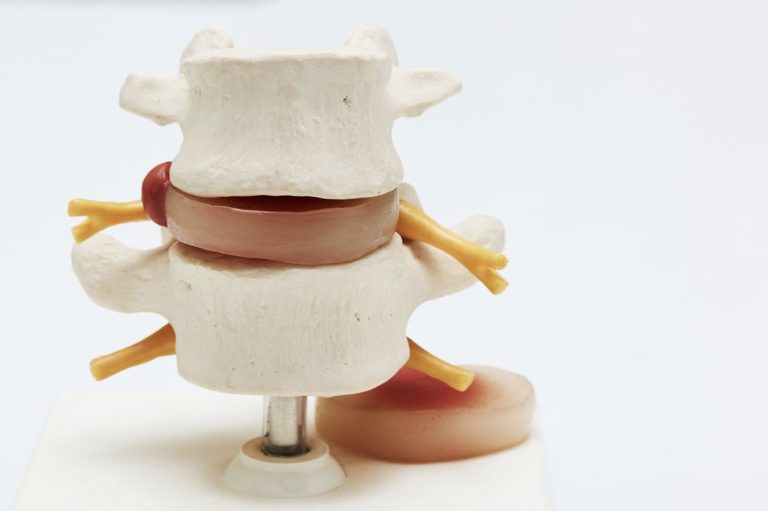A collapsed disc is a condition affecting the spinal discs that are largely connected to degenerative disc disease. This condition is mostly age-related changes that occur to the discs that cushion the vertebrae and allow for movement. Over time, these discs can lose water content and become brittle.
This makes them less flexible, leading to many problems, including bulging discs, herniated discs, and collapsed discs. Despite the name, a collapsed disc does not spontaneously collapse like a building. Instead, this refers to the gradual loss of disc height over time.
While the loss of disc height is not painful by itself, a severe collapsed disc causes compression between the vertebrae. The increased friction during movement can cause bone spurs, which combined with the loss of disc height, can increase the chances of a pinched nerve.
Whether you have a collapsed disc or are researching potential causes of pain, this guide can help. By learning more about treatment, you can take a more active approach to neck pain, back pain, or whatever symptoms are affecting your quality of life. Chronic pain caused by a collapsed disc does not always mean surgery, although it can be the best option in some cases.
If you have any questions as you read this overview, don’t hesitate to reach out. The BEST Health System team is here to help.
Commit to basic treatment and a healthy lifestyle
If a collapsed disc is diagnosed by a doctor as the cause of acute pain or chronic pain, the first step is usually a course of basic therapy. The goal is to manage symptoms and improve function. Commonly recommended treatments include:
- Rest to reduce stress on the spine
- Over-the-counter medication, such as nonsteroidal anti-inflammatory drugs (NSAIDs)
- Alternating hot and cold therapy, such as a heating pad and an ice pack
- Gentle stretches
While the underlying causes of collapsed discs are non-reversible, it is still important to commit to a spine healthy lifestyle. There are several ways to reduce the overall pressure on the discs, which can both help to relieve neck or back pain and potentially slow down disc degeneration. Lifestyle adjustments that can help a collapsed disc include:
- Correcting posture
- Managing weight
- Improving mechanics
- Eating a nutrient-rich diet
- Getting regular exercise to improve blood flow and strengthen supporting muscles
The importance of physical therapy and other interventions for chronic pain
If symptoms don’t improve with basic treatments, more advanced therapy may be the next step. Physical therapy can help treat collapsed disc symptoms and improve function. A therapist can work with you to develop a personalized treatment plan consisting of therapeutic exercise, hands-on manual therapy, and other steps.
Another common pain management intervention for chronic pain related to a collapsed disc, bulging disc, or herniated disc is a therapeutic injection. A guided steroid injection can help to relieve inflammation and pain for a period of weeks or longer.
When to consider surgery for collapsed disc treatment
Surgery for a collapsed disc is usually seriously considered if other treatments have been attempted and chronic pain and other symptoms are negatively affecting the quality of life and activities.
Approaches to collapsed disc surgery vary depending on the severity of the loss of disc height and the extent of nerve compression. Decompression procedures can remove disc or bone material that is putting pressure on nerves. Stabilization procedures, also known as fusion, may be required if full disc removal is needed.
With advances in microsurgical technology and the continued development of techniques and treatment protocols, many procedures for the treatment of collapsed discs can be performed on an outpatient basis. Always discuss the possibility of minimally invasive spine surgery with a treating physician or prospective surgeon.
Learn more from the experts at BEST Health System today
To learn more about our comprehensive approach to collapsed disc treatment, contact BEST Health System today. Our minimally invasive spine surgery is performed on an outpatient basis, leading to a reduced complication risk and a more streamlined recovery compared to traditional hospital-based neck or back surgery. No matter where you are in your treatment journey, our team can help you develop a customized treatment plan that fits your needs and lifestyle.
